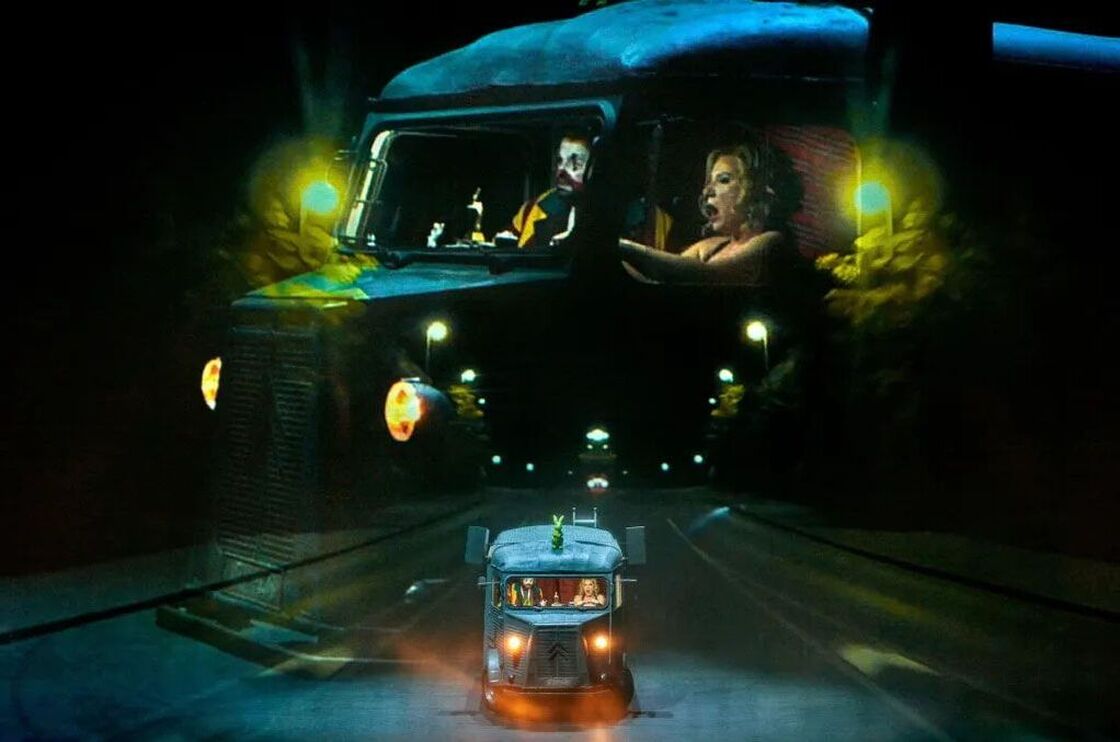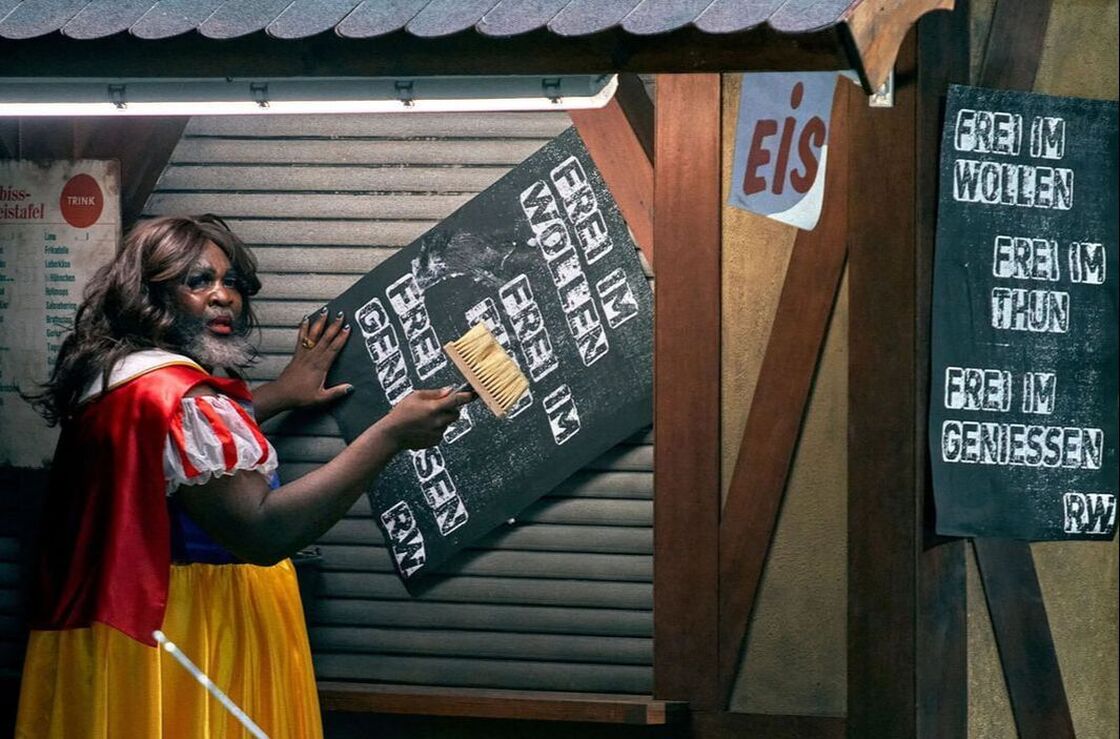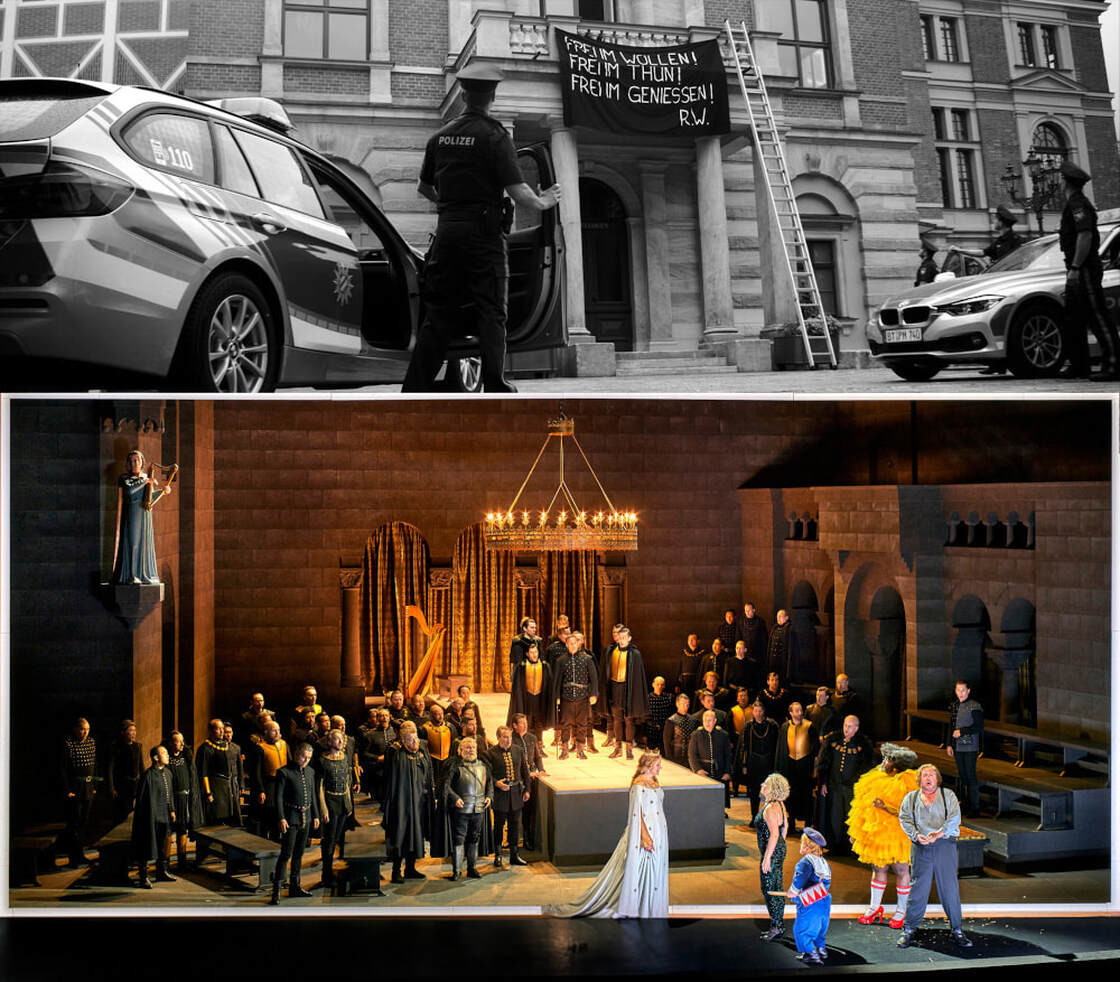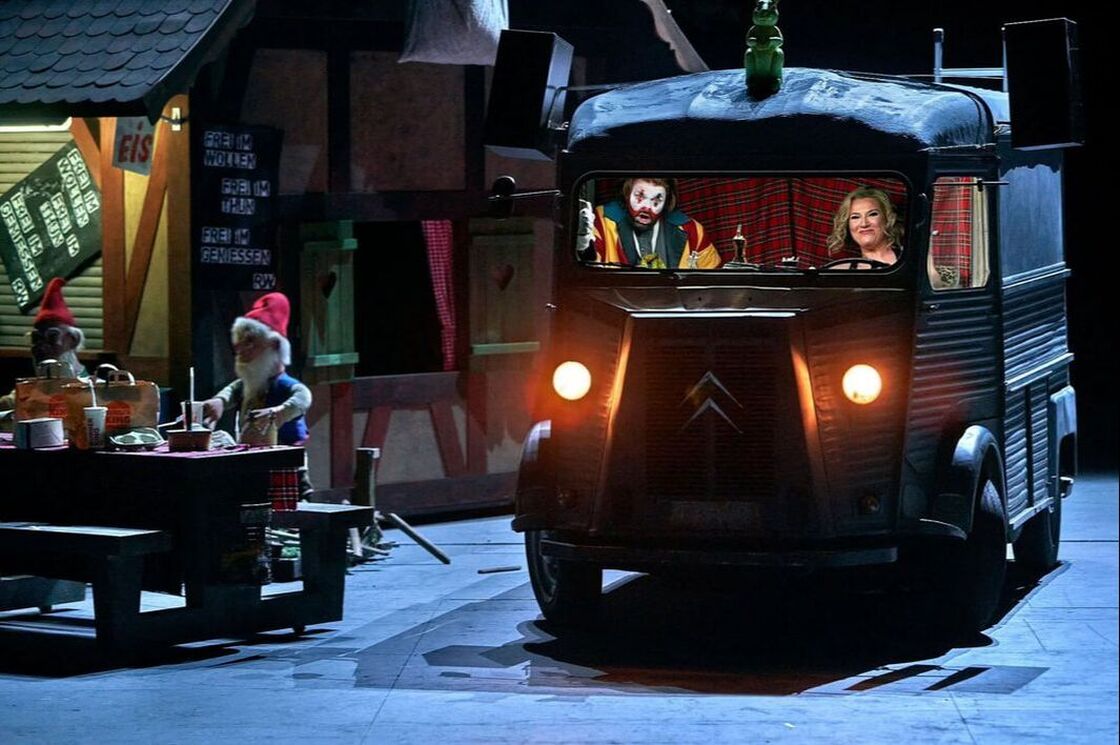Tobias Kratzer's groundbreaking Tannhäuser
Tobias Kratzer's Tannhäuser production, which premiered in Bayreuth five years ago, is absolute top-notch theatre. A uniquely moving and compelling production in which everyone involved - singers, actors, orchestra and chorus - play a glorious role.
That the production of Tannhäuser that Tobias Kratzer made for Bayreuth is a special one I already knew thanks to the video released after the premiere in 2019. That this Tannhäuser was nevertheless able to generate so much energy and enthusiasm live, harboured such theatrical power, nonetheless came as a great, extremely pleasant, surprise. Kratzer succeeds where many who venture into reinterpreting Wagner's operas fail. He is like that jazz musician whose thorough knowledge of the source material allows him great liberties in performance without getting lost in the process. The difference with Parsifal, which I saw the day before, could not be greater. Whereas Scheib's Parsifal production searches for the possibilities of stretching the stage image beyond the stage, expanding it with an extra layer, and therein lingers in the novelty of new technologies, Kratzer's Tannhäuser proves that real thinking beyond the confines of the stage, the real expansion of the mind, is accompanied by sublime ideas in which technology a means and not an end.
With Wagner, the struggle between lust and love is one with diffuse boundaries. In his operas, a great artist as he was, he was careful not to postulate platitudes and obvious answers to salient questions. Whereas Venus, paragon of carnal lust cannot do without spiritual love, Elisabeth, paragon of chaste love, is not insensitive to the physical side of love. A choice by Tannhäuser between one of the two cannot take place until Venus shows to possess some of Elisabeth's traits and a bit of Venus appears to dwell in Elisabeth. But the choice between the worlds of Venus and Elisabeth involves more than sex and love. As in his Tannhäuser production in Bremen over 10 years ago, Kratzer stretches the story of Tannhäuser far beyond the clash between carnal attraction and exalted ideals of purity. He turns it into a story about finding your place in the world and how personal freedom in it relates to social conventions and moral boundaries. In his Bremen production he made Tannhäuser an anarchist, a member of a terrorist cell, in this production he moves Tannhäuser to the circus. The premise is the same. During the overture, Tannhäuser's conscience suffers when someone dies and he prepares to abandon Venus & co. Choosing a life free of social conventions does not absolve him from the consequences of his actions.
With Wagner, the struggle between lust and love is one with diffuse boundaries. In his operas, a great artist as he was, he was careful not to postulate platitudes and obvious answers to salient questions. Whereas Venus, paragon of carnal lust cannot do without spiritual love, Elisabeth, paragon of chaste love, is not insensitive to the physical side of love. A choice by Tannhäuser between one of the two cannot take place until Venus shows to possess some of Elisabeth's traits and a bit of Venus appears to dwell in Elisabeth. But the choice between the worlds of Venus and Elisabeth involves more than sex and love. As in his Tannhäuser production in Bremen over 10 years ago, Kratzer stretches the story of Tannhäuser far beyond the clash between carnal attraction and exalted ideals of purity. He turns it into a story about finding your place in the world and how personal freedom in it relates to social conventions and moral boundaries. In his Bremen production he made Tannhäuser an anarchist, a member of a terrorist cell, in this production he moves Tannhäuser to the circus. The premise is the same. During the overture, Tannhäuser's conscience suffers when someone dies and he prepares to abandon Venus & co. Choosing a life free of social conventions does not absolve him from the consequences of his actions.
The world of Venus is the world of the circus people, the bohemians. The people who oppose the elite and the bourgeoisie, the world where Tannhäuser comes from, the world of Bayreuth. Tannhäuser goes back to Bayreuth and Venus and her company, Oskar (a dwarf with a Blechtrommel, played by Manni Laudenbach) and a drag queen (Le Gateau Chocolat), follow him there in a van at the end of the first act. It is in the first intermission where the production takes us outside and the audience literally becomes part of the staging. At the pond in front of the Festspielhaus, Venus & co perform an act in which songs are sung, Le Gateau Chocolat sings 'Dich, teure Halle' and there are calls for revolution (entirely in the spirit of Wagner who had to flee from Germany in 1849 for interfering in the revolution in Dresden). The effect of all this is exhilarating, hilarious and liberating. Remarkably, the insertion of pop culture and LBGTQ activism into an opera production does not for a moment feel forced. Kratzer creates a world that reaches beyond the stage, even beyond the walls of the Festspielhaus, in which everything finds its place naturally. The fun doesn't end then because in the second act, Venus & co invade the Festspielhaus where, at that moment, the Wartburg's singing competition is just beginning. (Those people who think a production should follow the libretto can stop ticking off deviations from that libretto. That makes no sense here. But despite the complete retelling of the original story, action, singing, acting and music remain intimately connected). During the singing competition, it becomes clear how far Tannhäuser and his former comrades have drifted apart. His best friend Wolfram sings about the well of love, to which Tannhäuser (who is consistently addressed as Heinrich in the opera) replies that you cannot speak of the well if you have never drunk from it. It causes disgust with the knights/singers, with Elisabeth and with her uncle Landgrave Hermann who all feel that Tannhäuser is showing himself to be an unforgivable sinner. The circus turns up and steps, at the front of the stage, outside the frame that surrounds the stage. When Venus challenges Elisabeth to step outside the frame, to step outside her comfort zone, Elisabeth accepts the challenge. She will give her fate a decisive dramatic turn with it. In the end, Tannhäuser is arrested by the police (the trip to Rome here is a ride to the police station).
The at times operetta-kind of exuberance comes to an end in the third act. We see a desolate landscape with the circus van in badly dilapidated condition. On an advertising billboard we see that Le Gateau Chocolat has escaped misery and lent its name to an expensive watch brand. Sitting in front of the van, Oskar tries, in vain, to warm up a can of cold beans. Elisabeth joins him; she is looking for Tannhäuser. He does not appear to be present. Wolfram is there and he, in all his tormented awkwardness, tries to court Elisabeth. To do so, he puts on Tannhäuser's clown suit. And here Kratzer again gives a special twist to the fate of Elisabeth and Wolfram. The libretto states that Elisabeth, having decided to sacrifice herself for Tannhäuser's sins, makes her way toward the Wartburg. Wolfram asks her if he can accompany her (Elisabeth, durft' ich dich nicht geleiten?). Elisabeth rejects this and then disappears from the scene. At Kratzer, Wolfram in clown costume and Elisabeth kiss and Elisabeth knows immediately that it is not Tannhäuser she has before her. Wolfram takes off his wig and sings 'Elisabeth, durft' ich dich nicht geleiten?' after which Elisabeth puts Wolfram's wig back on and pulls him into the van with her. There they have sex. Wolfram then sings his famous aria 'O du mein holder Abendstern'. No less tormented than before. Although he has now (contrary to the libretto) drunk from the well, the loveless sex has brought him no relief.
Elisabeth willfully abandons herself to a surrogate, Wolfram, when she cannot have the man she loves in spite of everything, Tannhäuser. Her death here is not a heaven-inspired act of self-sacrifice but one born of despair and disillusionment. Elisabeth's death paints the ultimately sung lyrics about Tannhäuser's forgiveness for his sins (beautiful chorus, heavenly music) pitch-black. We can hope that Tannhäuser eventually learns something from his behaviour. As a dead Elisabeth lies in his arms, we see on a video screen the circus van driving out of the picture with Tannhäuser at the wheel and Elisabeth at his side. Tannhäuser is left with the dream, a place in the mind, to be with the woman who truly loved him. Thus ends a production in which we could laugh, uncommon with Wagner, on the sombre undertones of existential drama.
Elisabeth willfully abandons herself to a surrogate, Wolfram, when she cannot have the man she loves in spite of everything, Tannhäuser. Her death here is not a heaven-inspired act of self-sacrifice but one born of despair and disillusionment. Elisabeth's death paints the ultimately sung lyrics about Tannhäuser's forgiveness for his sins (beautiful chorus, heavenly music) pitch-black. We can hope that Tannhäuser eventually learns something from his behaviour. As a dead Elisabeth lies in his arms, we see on a video screen the circus van driving out of the picture with Tannhäuser at the wheel and Elisabeth at his side. Tannhäuser is left with the dream, a place in the mind, to be with the woman who truly loved him. Thus ends a production in which we could laugh, uncommon with Wagner, on the sombre undertones of existential drama.
When Wagner voiced at the end of his life that he owed the world another Tannhäuser (he revised the opera several times, but never quite to his satisfaction), he must not have envisioned Tannhäuser as a clown in a circus for future productions. It is thanks to Kratzer's genius that we now no longer find that idea at all far-fetched or ridiculous. Whatever else you might call it, Regietheater or not, this Tannhäuser is absolutely top-notch theatre. It adds to Wagner's themes of love, lust, death and redemption, contemporary topics like (gay) emanicaption and finding your place in society. It results in a rarely moving and compelling theatre experience in which the singers, actors, orchestra and chorus shine.
When I first visited Bayreuth in 2014, Klaus Florian Vogt was the Lionel Messi amongst the Lohengrins; it was hard to imagine him in any other Wagner role. But Vogt has expanded his Wagner repertoire and his performance as Tannhäuser was, both singing and acting, penetrating, urgent and absolutely convincing. (Vogt stepped in for Stephen Gould who had to cancel due to health reasons - at the time of writing, news is coming out these health problems, highly unfortunate, mean the end of Gould's career.) Ekaterina Gubanova, after Kundry the day before where she 'only' had to rely on voice and stage presence, could now completely indulge in the space that the direction gave her here. Dramatically, sensually and expressively, she filled that space with everything she had - and a little more. Elisabeth Teige portrayed a particularly beautiful and powerful Elisabeth in which she handled the extra tragic, worldly fate that awaited her in this production with great dramatic elan. Furthermore, Julia Grüter sang a very beautiful Young Shepherd. In Markus Eiche, the contradictions that make Wolfram such a beautiful, strange and moving character came together effortlessly, and Günter Groissböck, as Landgrave Hermann, once again showed a succinct stage personality.
What also stood out was that the video footage worked very well in a live performance too. Often, video images are gratuitous. Then its use feels forced without adding anything substantial. More than once they recall what Patrice Chéreau once said about the use of video on stage. Besides being a theatre director, Chéreau was of course a filmmaker but he was quite outspoken about the use of film on stage. A film screen and the theater stage are two different things, he did not see how you could successfully bring them together (he therefore refused to have the third act in his production of Lulu begin with a video film, as prescribed by Alban Berg himself). But here the video was very illustrative and provided something extra. The video with backstage footage showed us the singers as both themselves and the role they were performing. It added an extra layer to the many layers the production already had.
This Tannhäuser was definitely among one of the best performances I have ever seen in a theatre, any theatre. And the extra good news with that is that Tobias Kratzer will be venturing into a complete Ring cycle in Munich next year.
When I first visited Bayreuth in 2014, Klaus Florian Vogt was the Lionel Messi amongst the Lohengrins; it was hard to imagine him in any other Wagner role. But Vogt has expanded his Wagner repertoire and his performance as Tannhäuser was, both singing and acting, penetrating, urgent and absolutely convincing. (Vogt stepped in for Stephen Gould who had to cancel due to health reasons - at the time of writing, news is coming out these health problems, highly unfortunate, mean the end of Gould's career.) Ekaterina Gubanova, after Kundry the day before where she 'only' had to rely on voice and stage presence, could now completely indulge in the space that the direction gave her here. Dramatically, sensually and expressively, she filled that space with everything she had - and a little more. Elisabeth Teige portrayed a particularly beautiful and powerful Elisabeth in which she handled the extra tragic, worldly fate that awaited her in this production with great dramatic elan. Furthermore, Julia Grüter sang a very beautiful Young Shepherd. In Markus Eiche, the contradictions that make Wolfram such a beautiful, strange and moving character came together effortlessly, and Günter Groissböck, as Landgrave Hermann, once again showed a succinct stage personality.
What also stood out was that the video footage worked very well in a live performance too. Often, video images are gratuitous. Then its use feels forced without adding anything substantial. More than once they recall what Patrice Chéreau once said about the use of video on stage. Besides being a theatre director, Chéreau was of course a filmmaker but he was quite outspoken about the use of film on stage. A film screen and the theater stage are two different things, he did not see how you could successfully bring them together (he therefore refused to have the third act in his production of Lulu begin with a video film, as prescribed by Alban Berg himself). But here the video was very illustrative and provided something extra. The video with backstage footage showed us the singers as both themselves and the role they were performing. It added an extra layer to the many layers the production already had.
This Tannhäuser was definitely among one of the best performances I have ever seen in a theatre, any theatre. And the extra good news with that is that Tobias Kratzer will be venturing into a complete Ring cycle in Munich next year.
TANNHÄUSER, Bayreuther Festspiele 16 August 2023
Production:
Director – Tobias Kratzer
Designs – Rainer Sellmaier
Video – Manuel Braun
Lighting – Reinhard Traub
Dramaturgy – Konrad Kuhn
Chorus director – Eberhard Friedrich
Cast:
Hermann, Landgraaf van Thuringia – Günter Groissböck
Tannhäuser – Klaus Florian Vogt
Wolfram von Eschenbach – Markus Eiche
Walther von der Vogelweide – Siyabonga Maqungo
Biterolf – Olafur Sigurdarson
Heinrich der Schreiber – Jorge Rodriguez-Norton
Reinmar von Zweter – Jens-Erik Aasbø
Elisabeth – Elisabeth Teige
Venus – Ekaterina Gubanova
Young Shepherd – Julia Grüter
Le Gateau Chocolat – Le Gateau Chocolat
Oskar – Manni Laudenbach
Bayreuth Festival Chorus (chorus director: Eberhard Friedrich)
Bayreuth Festival Orchestra
Nathalie Stutzmann (conductor)
Production:
Director – Tobias Kratzer
Designs – Rainer Sellmaier
Video – Manuel Braun
Lighting – Reinhard Traub
Dramaturgy – Konrad Kuhn
Chorus director – Eberhard Friedrich
Cast:
Hermann, Landgraaf van Thuringia – Günter Groissböck
Tannhäuser – Klaus Florian Vogt
Wolfram von Eschenbach – Markus Eiche
Walther von der Vogelweide – Siyabonga Maqungo
Biterolf – Olafur Sigurdarson
Heinrich der Schreiber – Jorge Rodriguez-Norton
Reinmar von Zweter – Jens-Erik Aasbø
Elisabeth – Elisabeth Teige
Venus – Ekaterina Gubanova
Young Shepherd – Julia Grüter
Le Gateau Chocolat – Le Gateau Chocolat
Oskar – Manni Laudenbach
Bayreuth Festival Chorus (chorus director: Eberhard Friedrich)
Bayreuth Festival Orchestra
Nathalie Stutzmann (conductor)
- Wouter de Moor




